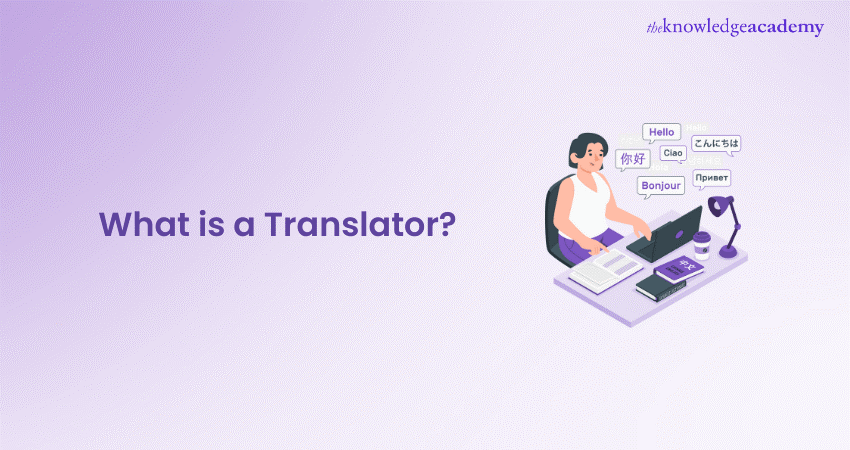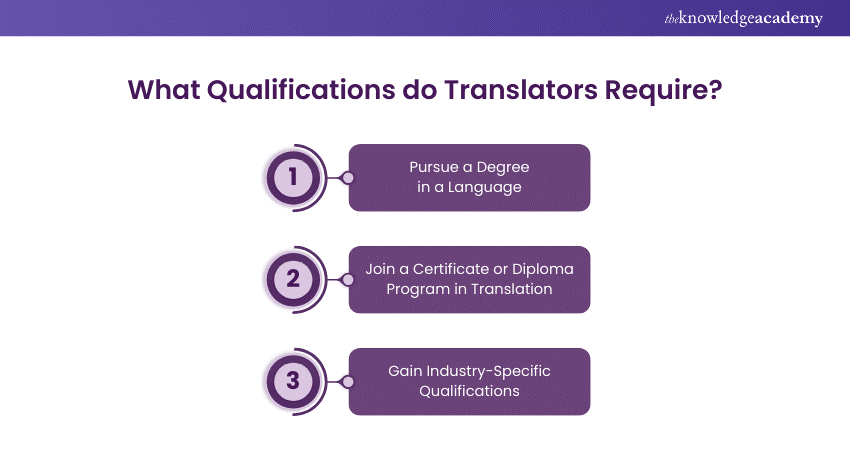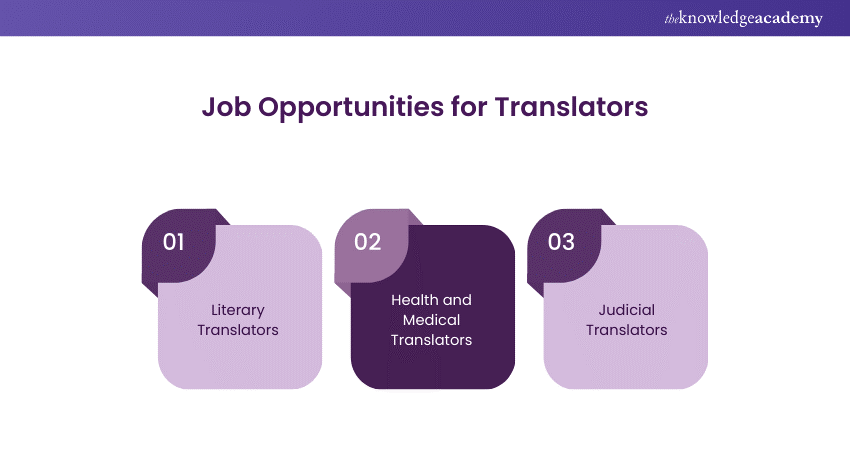We may not have the course you’re looking for. If you enquire or give us a call on +44 1344 203 999 and speak to our training experts, we may still be able to help with your training requirements.
Training Outcomes Within Your Budget!
We ensure quality, budget-alignment, and timely delivery by our expert instructors.

Are you passionate about languages and the magic they hold? Imagine being the bridge that connects people across the world, turning words from one language into another. If you find joy in sharing knowledge and helping others understand new concepts, then a career as a Translator might be your calling.
In today’s global marketplace, businesses are constantly reaching out to new audiences, and that’s where Translators come in. They play a vital role in making sure that everyone, no matter where they are or what language they speak, can understand and connect with a company’s message. From product details to marketing materials and website content, Translators ensure that nothing gets lost in translation.
Curious about this exciting field? Dive into our blog to discover more about the life of a Translator and how you can embark on this rewarding journey.
Table of Contents
1) Understanding Who is a Translator?
2) What Does a Translator do?
3) Types of Translators
4) What Qualifications do Translators Require?
5) What Skills do Translators Require?
6) Job Opportunities for Translators
7) Conclusion
Understanding Who is a Translator?
A Translator is a skilled professional tasked with the precise conversion of content from one language to another, ensuring the original message’s intent, accuracy, and cultural context are preserved. They possess a thorough understanding of both the source and target languages, encompassing grammar, idiomatic expressions, and cultural subtleties.
In diverse sectors such as literature, law, technical documentation, and marketing, Translators are pivotal in bridging linguistic and cultural gaps, facilitating effective communication and comprehension across different languages and cultures.
What Does a Translator do?
A Translator has several roles and responsibilities. Some of these include:
Rewriting Original Material in the Target Language
Translators skillfully convey the meaning and spirit of the source material to the target language without changing the message or its registers. This step goes beyond mere Translation because it involves properly adapting the content to fit the target population’s cultural context.
To preserve the essence of the work, this task requires a solid mastery of the language and extensive knowledge of the culture.
Proofreading and Making Final Editions to Translated Versions
After the Translation process, the Translators and proofreaders go through the text to ensure that the information in the translated document is accurate, logical, and harmonious. This entails reviewing the document to ensure no grammatical mistakes, correct terminology, and minor changes for clarity.
These changes are important to ensure that the final polished and media-ready version satisfies the client and appeals to the audience.
Finding Correct Translation of Legal, Technical, and Phraseology Terms
Translators frequently deal with intricate legal and technical terms that demand precise Translation. They conduct thorough research to verify the correct terms to use, ensuring they convey the exact intended meaning from the original document.
This rigorous process is crucial to prevent misunderstandings and guarantee that the translated document is legally and technically accurate.
Finding the Equivalent for Words Used with Specialist Dictionaries, Thesauruses, and Reference Books
Translators use specialist dictionaries, thesauruses, and reference books to identify appropriate equivalents to certain word forms. These resources help them identify the best terms and phases within the context and semantics of the source text.
This step is crucial in controlling the quality and accuracy of the Translation, especially in such specialised areas as medicine, law, and technology.
Types of Translators
If you want to explore this domain, here are some different types of Translators that you can become:
Literary Translation
Literary Translators interpret novels, poems, and plays for the target language. Their function does not stop at translating words; they also need to translate the source text's mood, character, and other features, thus maintaining its aesthetic value. This requires an appreciation of literature and the ability to creatively target content at a different elite.
Professional Translation
Professional Translators deal with documents in several fields, such as legal, health, accounting, and technology. They require careful work since any error could lead to a significant misunderstanding or a legal issue. They tend to specialise in certain fields to provide Professional Translations that meet standards and legal requirements.
Do you want to learn new skills to make progress in your professional career and your personal life? Then register now for our Personal Development Courses!
What Qualifications do Translators Require?
These are some of the qualifications that are required to become a Translator:

Pursue a Degree in a Language
Aspiring Translators typically start their career path by earning a degree in a particular language. This academic pursuit provides a comprehensive understanding of the language, including its grammar, syntax, and vocabulary. Furthermore, studying a language at the university level allows students to delve into the cultural and historical aspects of the language, which are crucial for producing precise and culturally sensitive Translations.
The coursework usually encompasses literature, linguistics, and extensive writing practice, all of which contribute to a solid groundwork for Translation tasks. Numerous language programs also offer opportunities to study abroad, providing immersive experiences that enhance both language skills and cultural understanding.
Join a Certificate or Diploma Program in Translation
Translation certificate or diploma programs are designed to equip students with practical skills and theoretical knowledge relevant to the Translation industry. These programs explore Translation methodologies, industry standards, and the use of Translation tools such as Computer-assisted Translation (CAT) software.
These programs often include hands-on projects and internships that simulate real-world Translation situations, providing invaluable experience. Many of these programs offer specialisations in legal, medical, or technical Translation, allowing students to tailor their education to their career goals.
Completion of a certificate or diploma program enhances a Translator’s abilities and demonstrates their commitment and professionalism to prospective employers.
Gain Industry-Specific Qualifications
Obtaining industry-specific certifications is crucial for Translators who wish to specialise in certain fields. These certifications offer a deep understanding of the terminology, norms, and regulatory demands of industries such as law, medicine, finance, or engineering.
For instance, a legal Translator could find value in pursuing a course in legal studies or earning a certification from a recognised professional organisation like the American Translators Association (ATA).
In a similar vein, a Medical Translator might consider obtaining a certification in medical terminology or a related healthcare qualification. These specialised credentials ensure that Translators can accurately and effectively communicate intricate information, adhere to industry standards, and deliver top-notch services to their clients. Such qualifications also boost credibility, thereby expanding job prospects and potential earnings.
Enhance your knowledge of how to develop the right skills to become a professional Translator – join now for our Translation Course!
What Skills do Translators Require?
Here are some skills that are required to become a Translator:
a) Bilingual Proficiency: A certain level of language proficiency in both the Translation target and the source language is expected: it means being familiar with grammar, lexis, idioms, etc., and cultural references.
b) Cultural Competence: Understanding cultural settings is crucial to avoid incorrect meanings and hence provide appropriate Translations that do not lose the intended message’s objective.
c) Writing Skills: Fluency in the use of the second language is important for producing expressive texts that are easy to understand and interesting to read as if it were a native speaker of that language.
d) Research Skills: It is crucial to ensure accuracy, especially when translating areas that are technical, e.g. legal, medical, or technical; the Translators must be able to research the right term, concept and context.
e) Attention to Detail: Punctual and accurate Translation is important because it is easy to mistranslate by making a small error that changes the overall meaning of the text thus requiring keen precision.
f) Time Management: Effective management of time results in effective Translation services delivery and Translation of many projects while addressing tight schedules.
g) Computer Literacy: Understanding of Translation technology refers to CAT tools and other related tools that enhance efficiency and precision in Translation tasks.
h) Subject Matter Expertise: Expertised in certain areas like legal, medical, or IT enables such Translators to translate professionally difficult texts.
i) Adaptability: The ability to adopt different writing styles, write in different tones, and translate for different types of projects is always important to ensure that the translated work meets the client and the project’s needs.
j) Communication Skills: Good communication skills help deal with clients, editors and other users to ensure that Translations suit the agreed and necessary criteria.
Job Opportunities for Translators
If you are worried about job prospects as a Translator, then you needn't worry because there are a lot of job opportunities open to this profession. Some of these job opportunities are:

Literary Translators
Literary Translators specialise in translating novels, poems, short stories, and other scholarly works. They play a pivotal role in making literature from various cultures accessible to a broader audience, enabling readers to enjoy and appreciate literary works they might not otherwise have access to.
Literary Translators often collaborate closely with authors and publishers to ensure the Translation accurately reflects the original work's style, tone, and subtleties. This field requires a profound appreciation for literature, excellent writing abilities, and a deep understanding of cultural contexts.
Health and Medical Translators
Health and Medical Translators work in the healthcare industry, translating medical documents, patient records, research papers, and other materials. They need a robust understanding of medical terminologies in the source and target languages and knowledge of medical procedures, diseases, and treatments.
Health and Medical Translators play a vital role in ensuring accurate communication of medical information to patients, healthcare providers, and researchers, thereby aiding in improving healthcare outcomes and facilitating international collaboration in medical research and practice.
Judicial Translators
Judicial Translators work in the legal sector, translating legal documents, court transcripts, and other legal materials. They need a robust understanding of legal terminologies and procedures in the source and target languages and knowledge of the legal systems of both countries.
Judicial Translators play a vital role in ensuring that legal proceedings are conducted accurately and fairly, especially in cases involving parties who speak different languages. They must also maintain strict confidentiality and impartiality, adhering to professional standards and ethical guidelines.
Do you want to be more productive? Then, learn how you can do so with Attention Management Training!
Conclusion
By now, you should have a clearer picture of What is a Translator, the diverse roles they play, and the exciting opportunities that await in this field. As a Translator, you’re not just converting words; you’re opening doors to new cultures, ideas, and possibilities. Whether it’s helping a business communicate with its global audience or enabling people to access information in their native language, your work has the power to make a real difference.
Improve your attention capabilities with our Attention Management Training – register now!
Frequently Asked Questions

Translators work in various industries, including legal, medical, literary, technical, and business sectors.

Translators work in various industries, including legal, medical, literary, technical, and business sectors.

The Knowledge Academy takes global learning to new heights, offering over 30,000 online courses across 490+ locations in 220 countries. This expansive reach ensures accessibility and convenience for learners worldwide.
Alongside our diverse Online Course Catalogue, encompassing 17 major categories, we go the extra mile by providing a plethora of free educational Online Resources like News updates, Blogs, videos, webinars, and interview questions. Tailoring learning experiences further, professionals can maximise value with customisable Course Bundles of TKA.

The Knowledge Academy’s Knowledge Pass, a prepaid voucher, adds another layer of flexibility, allowing course bookings over a 12-month period. Join us on a journey where education knows no bounds.

The Knowledge Academy offers various Personal Development Courses , including the Translation Course, Time Management Training, Attention Management Training. These courses cater to different skill levels, providing comprehensive insights into How to Create a Marketing Budget.
Our Business Skills Blogs cover a range of topics related to Translation, offering valuable resources, best practices, and industry insights. Whether you are a beginner or looking to advance your Translation skills. The Knowledge Academy's diverse courses and informative blogs have got you covered.
Upcoming Business Skills Resources Batches & Dates
Date
 Translation Course
Translation Course
Fri 7th Feb 2025
Fri 4th Apr 2025
Fri 6th Jun 2025
Fri 8th Aug 2025
Fri 3rd Oct 2025
Fri 5th Dec 2025







 Top Rated Course
Top Rated Course



 If you wish to make any changes to your course, please
If you wish to make any changes to your course, please


